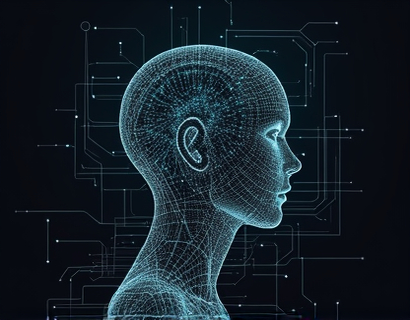Personalized AI Companions: Enhancing Children's Creativity and Emotional Health Through Interactive Digital Friends
In the rapidly evolving digital age, the integration of artificial intelligence in children's lives has opened new avenues for educational and developmental growth. One of the most promising innovations in this realm is the creation of personalized AI companions, often referred to as digital imaginary friends. These AI-driven entities are designed to provide children with interactive, engaging, and safe digital companions that can significantly boost their creativity and emotional health. This article delves into the transformative impact of these AI companions on childhood development, exploring how they foster imaginative play, support social skills, and offer a nurturing environment for emotional exploration.
The Concept of AI-Driven Imaginary Friends
AI-driven imaginary friends are sophisticated digital entities that use advanced algorithms and machine learning to understand and respond to a child's interactions. These companions are not mere pre-programmed responses but dynamically adapt to the child's personality, interests, and emotional state. The core idea is to create a virtual friend that can grow and evolve alongside the child, providing a consistent and reliable source of companionship and support.
The development of these AI companions involves a multidisciplinary approach, combining expertise in artificial intelligence, child psychology, education, and design. The goal is to create a digital entity that can engage children in meaningful ways, encouraging them to explore their creativity and emotions in a safe and controlled digital environment. Unlike traditional toys or video games, AI companions can offer a level of personalization and adaptability that traditional methods cannot match.
Boosting Creativity Through Interactive Play
One of the most significant benefits of AI-driven imaginary friends is their ability to enhance children's creativity. Through interactive play, these digital companions encourage children to think outside the box, explore new ideas, and express themselves in unique ways. For instance, a child might engage in a storytelling session with their AI friend, where the companion suggests plot twists, characters, and settings based on the child's inputs. This collaborative storytelling process not only sparks imagination but also helps children develop narrative skills and a deeper understanding of storytelling structures.
Moreover, AI companions can introduce children to various creative activities such as drawing, music, and writing. By providing prompts and feedback, these companions motivate children to experiment with different forms of expression. For example, an AI companion might suggest a drawing challenge where the child creates a picture based on a random theme or object. This kind of interactive engagement not only fosters creativity but also builds confidence in the child's artistic abilities.
Supporting Emotional Health and Well-Being
Emotional health is a critical aspect of a child's overall development, and AI-driven imaginary friends play a vital role in supporting this area. These digital companions are designed to recognize and respond to a child's emotional cues, offering comfort, encouragement, and guidance when needed. For instance, if a child expresses feelings of sadness or anxiety, the AI companion can initiate a conversation to help the child process these emotions. By providing a safe and non-judgmental space, these companions help children develop emotional resilience and coping strategies.
Additionally, AI companions can assist in teaching children about different emotions and how to manage them effectively. Through interactive scenarios and role-playing exercises, children can learn to identify and express their emotions in healthy ways. This is particularly beneficial for children who may struggle with verbal communication or have difficulty understanding complex emotional concepts. The AI companion acts as a patient and understanding guide, helping the child navigate their emotional landscape.
Fostering Social Skills Development
Social skills are essential for a child's success in both personal and professional life. AI-driven imaginary friends can play a significant role in developing these skills by simulating social interactions and providing opportunities for practice. For example, a child can engage in role-playing games where the AI companion acts as a friend, family member, or teacher. These interactions can help children practice conversation skills, learn to take turns, and understand social norms and expectations.
Moreover, AI companions can facilitate empathy and perspective-taking by presenting scenarios where the child must consider the feelings and thoughts of others. Through these exercises, children learn to see things from different viewpoints, fostering a deeper sense of empathy and social awareness. This is especially valuable in today's interconnected world, where social skills are increasingly important for building and maintaining relationships.
Creating a Safe and Nurturing Digital Environment
One of the key advantages of AI-driven imaginary friends is the safe and controlled digital environment they provide. Unlike the internet at large, which can expose children to inappropriate content and online risks, these AI companions operate within a carefully curated space designed specifically for children. Parents and guardians can rest assured that their children are engaging in positive and educational activities without the fear of encountering harmful content.
The design of these digital companions also prioritizes child-friendly interfaces and content, ensuring that the experience is both enjoyable and age-appropriate. The AI algorithms are programmed to avoid any potentially distressing or confusing interactions, focusing instead on positive reinforcement and constructive feedback. This creates a nurturing environment where children feel safe to explore and learn.
Personalization and Adaptability
Each child is unique, with their own set of interests, abilities, and emotional needs. AI-driven imaginary friends excel in personalization, adapting to the individual characteristics of each child. Through continuous learning and data analysis, these companions can tailor their interactions to suit the child's evolving profile. For instance, if a child shows a particular interest in science, the AI companion can incorporate more science-related topics into their conversations and activities.
Personalization extends to the emotional and psychological aspects as well. The AI can detect changes in the child's mood or behavior and adjust its responses accordingly. For example, if a child is feeling particularly anxious, the AI might shift to a more calming and supportive tone, offering soothing words and relaxation techniques. This level of adaptability ensures that the companion remains relevant and beneficial to the child over time.
Parental Involvement and Support
While AI-driven imaginary friends offer a wealth of benefits, parental involvement remains crucial in the child's developmental journey. Parents can play an active role by participating in the child's interactions with the AI companion, providing guidance and context to the experiences. This collaboration ensures that the digital interactions align with the family's values and educational goals.
Parents can also use the insights provided by the AI companion to better understand their child's interests, strengths, and areas for improvement. Many platforms offer dashboards or reports that highlight the child's engagement patterns, emotional responses, and learning progress. This information can help parents tailor their support and engage in more meaningful conversations with their child about their experiences with the AI companion.
Challenges and Considerations
Despite the numerous benefits, the integration of AI companions in children's lives is not without challenges. One of the primary concerns is the potential for over-reliance on digital interactions, which could limit face-to-face social interactions. To mitigate this, it is essential to strike a balance between digital and real-world activities, ensuring that AI companions complement rather than replace traditional play and socialization.
Another consideration is the ethical use of data. AI companions collect data to personalize the experience, but it is crucial to handle this data with the utmost care and transparency. Parents should be informed about what data is collected, how it is used, and who has access to it. Robust privacy measures and compliance with child protection regulations are essential to build trust and ensure the responsible use of technology.
Conclusion
The integration of personalized AI companions into children's lives represents a significant leap forward in supporting their creativity and emotional health. These digital imaginary friends offer a unique blend of personalization, adaptability, and safety, creating a nurturing environment for growth and exploration. By fostering imaginative play, enhancing social skills, and providing emotional support, AI companions can play a vital role in shaping well-rounded and resilient individuals. As technology continues to evolve, the potential for AI to positively impact childhood development is vast, offering exciting possibilities for the future of education and child care.











































